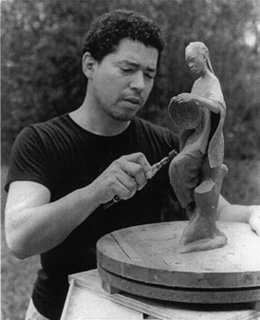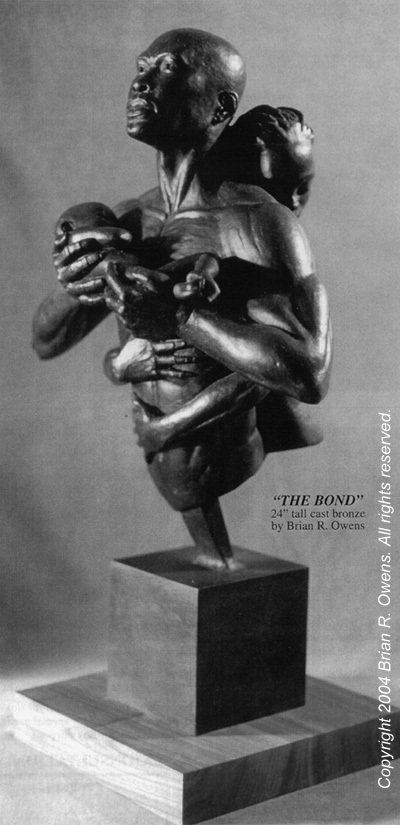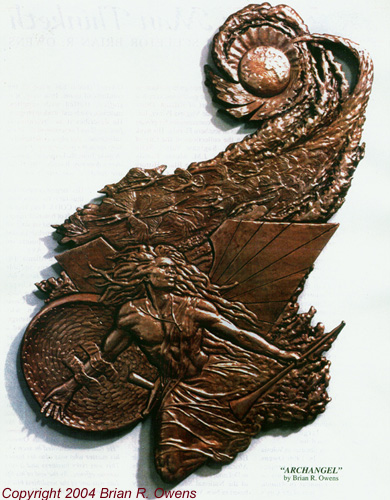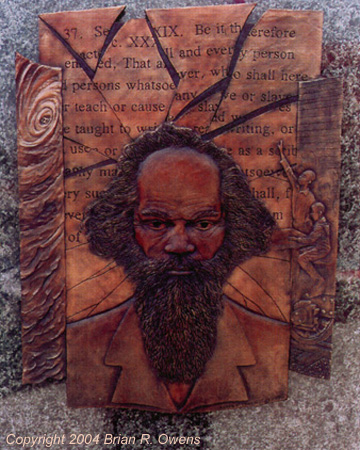
| brianowensart.com | (T)386-956-1724 |
| Back to Previous Page | |
| (This article ran in Shekina Glory Magazine, Feb/Mar 1999. It has been reconstructed below to save download time.) | |
 |
|
| From the look of things, you would have a better chance of finding an alligator than finding a professional sculptor in Deltona, Florida. "I get a lot done here because it is somewhat isolated" says Brian Owens, who lives and works in a house that he converted into a studio. "This is actually a good place to be at the moment because of the way the state is growing." Brian Owens has an engineering degree but is a largely self-taught sculptor and describes the past eight years as the wonderful obsession. "At first I watched sculptors as they worked, then I started working for free. I was drawn by the technical challenge of sculpture and bronze casting." In time he designed and built his own studio foundry, including various furnaces and special equipment in order to cast his own work. Owens body of work now includes private and public sculpture commissions in addition to his personal work. His personal work is in galleries in Florida and Atlanta and tends to center around the exploration of his heritage. His commissions include two large sculptures designed for the entrance to new libraries in Volusia County, Florida. In 1996 he completed an historical project commissioned by the Corporation for Olympic Development in Atlanta (CODA). This was part of the City's |
development campaign in preparation for the Olympic Games and is now a permanent part of Atlanta. Other patrons include Virginia Power, Inc. and multiple commissions for private clients in Southern Florida. His work is the collections of the City of Atlanta, saginaw Valley State University, J. M. Moran Family Enterprises and the Black History Museum and Cultural Center of Richmond, VA. He has twice won | Brian Owens' studio has none of the comforts of home. It a word, it is stuffed; stuffed with supplies, materials, easels and work in progress. He describes it as "relentlessly functional and unsentimental ... like a submarine ... this place is designed to keep me in the proper state of mind." A quote from Shakespeare is painted over a doorway. It reads, "All things are ready if our minds be so." His largest commission thus far is the work done for CODA. Four bronze reliefs of historical figures are mounted on six foot tall granite pylons located at various points on Auburn Ave. in downtown Atlanta. The four figures include entrepreneurs James Tate and Wesley Chapel Redding, educator Alice Dugged Cary and Carrie Steele Logan who founded an orphanage. "These people had a serious effect on the shape of history" says Owens. "fact is, they were just the tip of the iceberg." Of the four, Owens favorite subject is James Tate who is regarded by many historians as the father of black business in Atlanta. "Tate was 40 years old when they signed the emancipation proclamation" explains Owens. "He had been schooled in secret by his master who was also his father. This was risky business and a very serious offense. By the end of his life Tate was one of the wealthiest blacks in Atlanta, and a source of loans to a |

|
||
| the Newforms Florida program grant. He is on the Advisory Board to the African-American Museum of the Arts in DeLand, Florida and is a Colleague of the National Sculpture Society based in New York City. |
| SHEKINA GLORY: Page 49 |
| Back to Previous Page I Back to Top |
| lot of black businesses. Sometimes I wonder what I could accomplish if I had that kind of iron." To Owens, discipline and state of mind are just as important as talent. "We still have to get an education, acquire skills and adapt in a changing world but everything starts with our thoughts and what we believe is possible for us. That's what I like about Tate. He had been dealt an inferior hand but developed a superior state of mind." Brian Owens is inspired by the work of such nationally acclaimed sculptors as Elizabeth Cattlett, Ed Hamilton and Artis Lane. He claims he is never short of ideas for sculpture. "Ideas come easily. Translating an idea into something real is the challenge. I know I've come a long way but I haven't come anywhere close to exploring my potential yet. I need to see how good I can get over the next 35 years or so. This is what pulls me into the future. " He adds, "Nobody makes it alone, at least not in this business. Other people have to believe in you. You need to build connections with other people and that's where your state of mind becomes critical because you tend to attract the type of people and situations that match your state of mind." "I feel privileged to live in these times and I believe that history will judge these times as far more important a period than the Harlem Renaissance. On the whole, black artists may not have the best opportunities but that doesn't have to apply to me as an individual. One man or woman can beat the odds." What does the future hold? "I'll keep creating my personal work as I pursue commissions of larger scope and complexity. I'll expand my skills and explore new materials. The future requires new tools, a new work space and most of all I need to get better at controlling what I think." He smiled and nodded towards a small sign on a shelf. It's a quote based on Proverbs XXII: As a man thinketh, so shall he become. |

|
| SHEKINA: Page 51 |
| Back to Previous Page I Back to Top |

|
| SHEKINA GLORY: Page 50 |
| Back to Previous Page I Back to Top |

|
"FACED TOWARD THE FUTURE" Cast bronze relief by Brian R. Owens In memory of Reverend James Tate |
| Reverend James Tate, former slave from Elbert County, Georgia, was one of Atlanta's five wealthiest African-Americans in the 1870's. Tate opened grocery stores on Walton and Decatur Streets. Using an old railroad boxcar for a classroom, he assisted in opening the Walton Springs School, the first school in the city for African-Americans. Reverend Tate was also one of the original founders of Friendship Baptist Church, the birthplace of Spelman College. Reverend Tate played an active role in Atlanta politics for two decades. In cooperation with Reverend Frank Quarles, Tate established the Equal Rights Association in 1866. In 1870, Tate ran for the Georgia Assembly. He delivered the black vote from Atlanta's Third and Fourth Wards to the Republican Party in the city council race and, in 1879, organized African-American Republican Ward clubs. Tate died in 1897 and is buried in Atlanta's Oakland Cemetery. |
| SHEKINAH GLORY: Page 52 | |
| Back to Previous Page I Back to Top | |
| brianowensart.com | (T)386-574-5589 |
| © 2004 Brian R. Owens | |